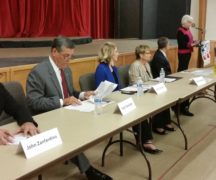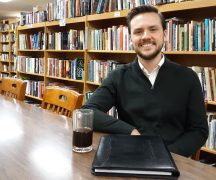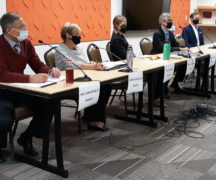By JAN LARSON McLAUGHLIN
BG Independent News
Bowling Green voters will see candidates on their ballots for one At-Large City Council seat and four ward seats. Three of those races are uncontested, with Second Ward incumbent Joel O’Dorisio facing no challenger, Third Ward incumbent Rachel Phipps running unopposed, and Fourth Ward Bill Herald also being unchallenged.
Two of the three At-Large council members – Council President Mark Hollenbaugh and Greg Robinette – are in the middle of their four-year terms.
That leaves two City Council races to be decided by voters.
The At-Large seat is being sought by incumbent Democrat Jeff Dennis and challenger Republican Eric Peck. The First Ward seat is being sought by Republican David Drain and Democrat Damon Sherry.
Here is some information on the candidates in those two contested races for City Council seats.
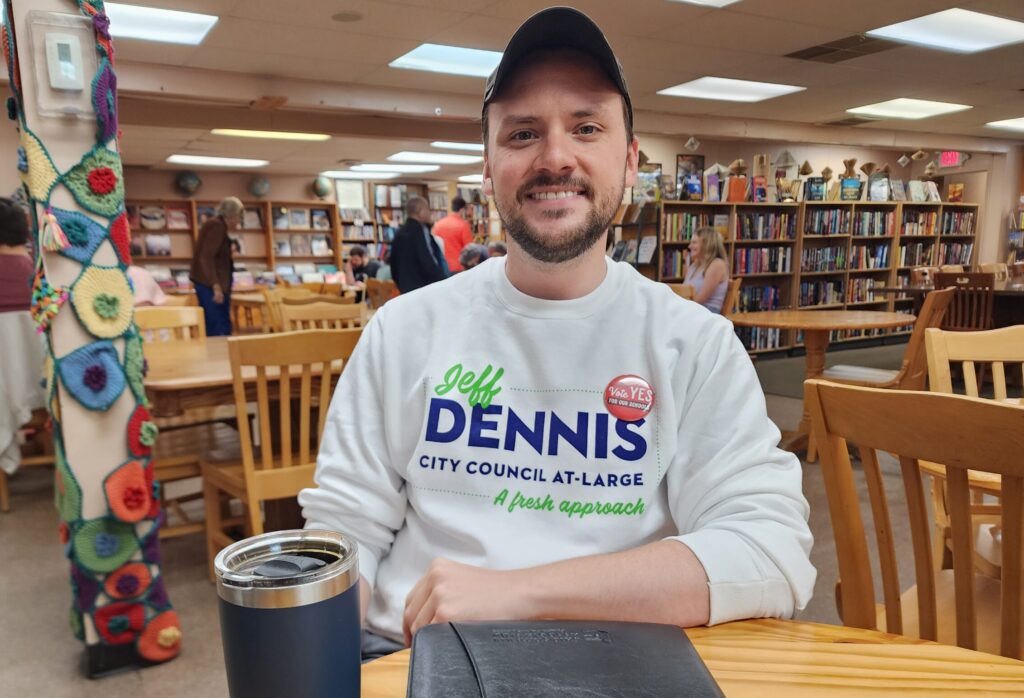
Bowling Green At-Large City Councilman Jeff Dennis believes in the public’s right to be part of their grassroots government.
That involvement was especially important, he said, when the city was deciding how to use its $7.2 million from the American Rescue Plan Act.
Dennis, a Democrat, who was chosen to fill the council seat after the death of Neocles Leontis, insisted in addition to the money earmarked for city infrastructure, that citizens be asked to submit their proposals.
“There was really no plan to engage the public, and we kind of put the brakes on,” he said. “We got more than 1,000 pieces of feedback.”
That resulted in money being granted for projects such as pickleball courts, a dog park, a shared walking path, public restrooms downtown, and housing assistance. Other funding was dedicated to local non-profit organizations.
“We were investing in the community and improving the quality of life,” Dennis said.
Dennis, a lifelong resident of Bowling Green, is proud of that effort to engage the community and work across party lines. He is running to keep his at-large council seat so he can continue those types of efforts.
Dennis, an attorney who serves as village solicitor for a couple area communities, sees four major challenges in Bowling Green, where progress has been made, but more must be done.
First is in the area of housing. Dennis pointed out the city’s doubling of grant funding for homeowners needing help with home repairs, mandated rental registration, and increased code enforcement to eliminate neighborhood nuisance issues.
“I’m for ensuring everyone has access to safe, affordable housing in a neighborhood they can be proud of,” he said.
While the city has made progress in registering rental housing units, fines need to be issued to those who haven’t complied, he said.
Next is safer pedestrian and bike infrastructure. Dennis acknowledged that he didn’t fully understand the importance of good sidewalks, “until I became a parent and tried to push a stroller” on uneven sidewalks.
Dennis is a proponent of safer sidewalks, more bike infrastructure and safe routes to school.
He supports investments in clean energy and reducing waste. City food waste composting efforts have kept 100,000 pounds of waste from being landfilled in the last two years. And he favors the city developing a roadmap for net-zero emissions from city services.
Dennis would like to see city recycling pickups in the downtown and at large apartment complexes. He suspects the big challenge is the cost of the collection equipment. But if enough locations get involved – like schools and industries – the costs could be spread out.
“There’s still a lot of opportunity there,” he said.
And Dennis sees progress in the city’s economic development, with focus on a vibrant downtown, new housing, and an investment in a new high school.
He also serves on the community organization, BG Families for Schools, and voted for City Council’s resolution supporting the bond issue to build a new Bowling Green High School.
“I think we are headed in a very positive direction,” he said. “I’m seeing a lot of positive momentum.”
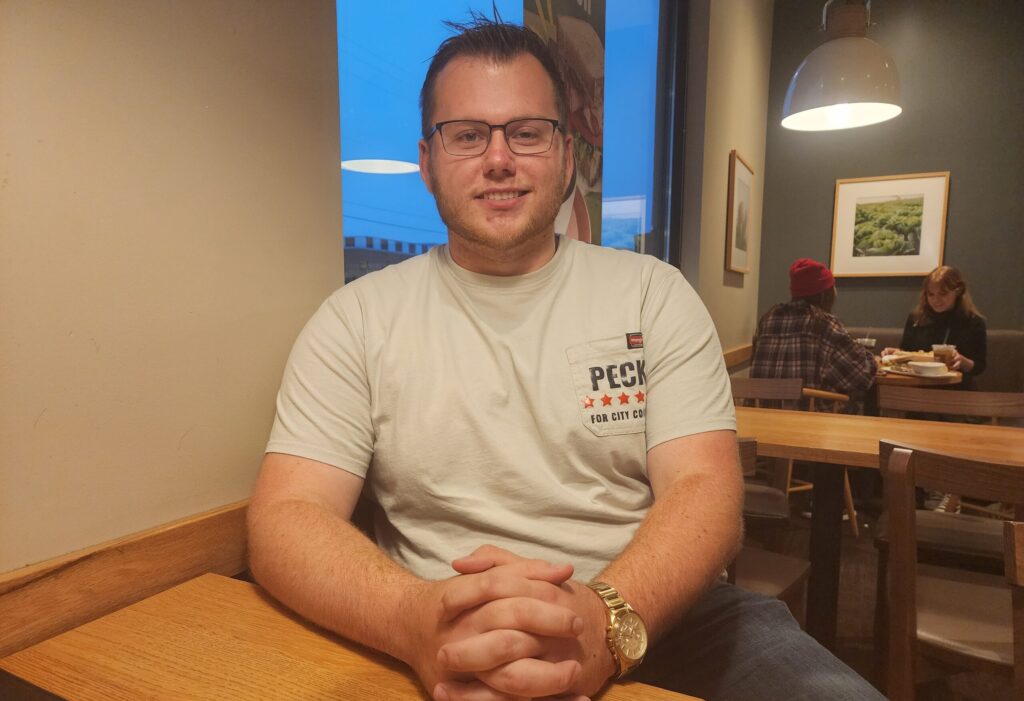
Eric Peck is a BGSU graduate who was part of the “pipeline between the university and town” and decided to buy a home in Bowling Green.
“I fell in love with the culture,” the historic landmarks and the downtown, he said. “I fell in love with the town.”
So to serve his community, Peck, a Republican, is running for the At-Large City Council seat.
“I think I will provide a different perspective,” he said.
Peck cited his past roles as a volunteer firefighter first with Allen Township Fire Department in Van Buren and more recently with Washington Township Fire Department in Tontogany.
“I’ve always had an attraction to public service,” he said. “It’s a way to give back.”
Peck said he works primarily from home with The Sak, a crochet handbag company, in the role of business intelligence and analytics.
While knocking on doors for his campaign, Peck found a familiar complaint from city residents of not getting prompt responses from city officials. Peck said his “very flexible schedule” will allow him time to respond to citizen concerns. He believes he can help with resident issues in a more efficient manner.
Peck has voiced his concerns about single family homes being turned into duplexes in Bowling Green. That would have “grave consequences” for the community, he said.
But he also believes that the city’s relatively new rental housing registration regulations should be given time to take effect. “Let’s enforce what we have, to see if it works.”
Peck supports the landlord self-inspection program, and would oppose the city charging a fee for inspections of rental units.
“I would not be in favor of that,” he said, predicting that would cause landlords to increase rental fees.
“We don’t want to self-inflict costs on tenants,” he said.
Though Peck supports the upcoming bond issue for a new high school, he said he would not have voted in favor of City Council’s resolution supporting the issue and encouraging voters to do the same.
“I’m a big believer in education. Education got me where I am today.”
“That being said, I don’t feel comfortable using a position of power” for a non-city issue. He opposes the resolution language that suggests citizens vote in favor of the bond issue. “I’ll never do that,” he said.
Peck said he grew up in a blue collar family, and adopted a “go-getter” attitude. He said he will approach City Council issues with the “same sense of urgency” as he approached being a volunteer firefighter. He vowed to focus solely on local issues.
“Bowling Green’s a great city. We should come together to make it better,” he said. “I will have a laser focused approach to city issues.”
Safety is a priority for Peck.
“I would be a huge advocate on City Council for our first responders, police and fire,” making sure they have all they need to do their jobs.
Fiscal responsibility is also valued by the candidate.
“We’ve got to make sure the return on investments is there,” he said, noting the need for repairing streets, sidewalks and other infrastructure. “That really revitalizes neighborhoods.”
“I want to continue to give back to the community,” he said. “I look at public service like it’s an honor.”
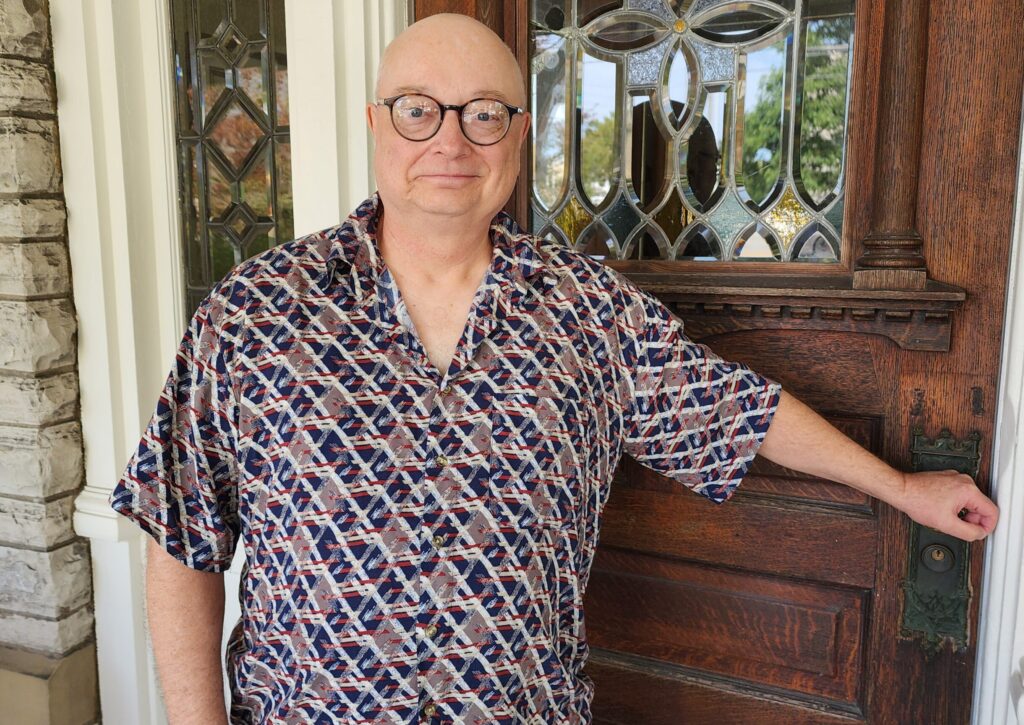
David Drain first began thinking about running for Bowling Green City Council eight months ago, when it became apparent to him that the city wasn’t listening to its constituents.
As owner of an historic home in the First Ward, Drain joined many residents of the neighborhoods surrounding downtown to protest a proposed zoning code change. The change would have allowed certain small businesses next to residences and allowed single-family homes to become duplexes.
“It would have ruined the neighborhoods,” Drain said.
“I realized council wasn’t listening at all,” he said, explaining his decision to run for the First Ward City Council seat. “It’s not something I ever thought I’d do.”
In the past eight months, Drain, a Republican, has had a steady presence at City Council meetings.
“We accomplished something big,” he said of the citizen-led effort to protect their neighborhoods.
But the work is not done.
Drain, a retired mathematician who primarily worked in manufacturing, wants to make sure efforts to protect older sections of the city continue. He supports the city’s relatively new programs to register and require self-inspections of rental housing properties.
“That’s a good start,” he said. “If the city actually follows through, that would be great.”
Campaigning door-to-door for council has been eye-opening for Drain.
“I go to properties where the stairs are falling apart,” he said. “I hope we can get the voluntary inspections to be enough.”
Drain, who owns one rental property, said the complaints by some landlords about the inspection criteria being too onerous, are unfounded.
“We need to get it off the ground. It can’t be that hard to do.”
If elected, some of Drain’s priorities would be to improve the city’s housing, keep single family homes from turning into rentals, clean up nuisance properties, and provide affordable housing.
He would also like to build on the city’s relationship with Bowling Green State University.
“I want to take advantage of the synergy we could have that we’re not using,” for expertise, employment and volunteer activities, he said. “Our relationship with BGSU could be way better than it is.”
Drain, a 1970 graduate of BGHS, supports the construction of a new Bowling Green High School, though he’d prefer if it weren’t totally funded by property taxes.
“I’d sure like us to have a new school,” he said. “I went to that old school when it was nice and shiny.”
Drain would like to see more growth of small to mid-size manufacturing in the city. That would result in “long-term employers, who keep people here. That’s how you pass school levies – if people are investing.”
He would like Bowling Green to stay the size it is right now. “You can walk where you need to go,” he said. But some type of accommodations should be made to help bicyclists traverse the city.
“It’s terrifying to ride a bicycle here,” he said.
Drain cited his experience teaching structured problem solving in industry, noting his skills in communication, listening and statistics.
“I’ve worked with lots of different people of different cultures,” he said.
Unlike student candidates from BGSU, who tend to be in the community for brief periods, Drain said he is committed to Bowling Green.
“I’m here to stay,” he said.
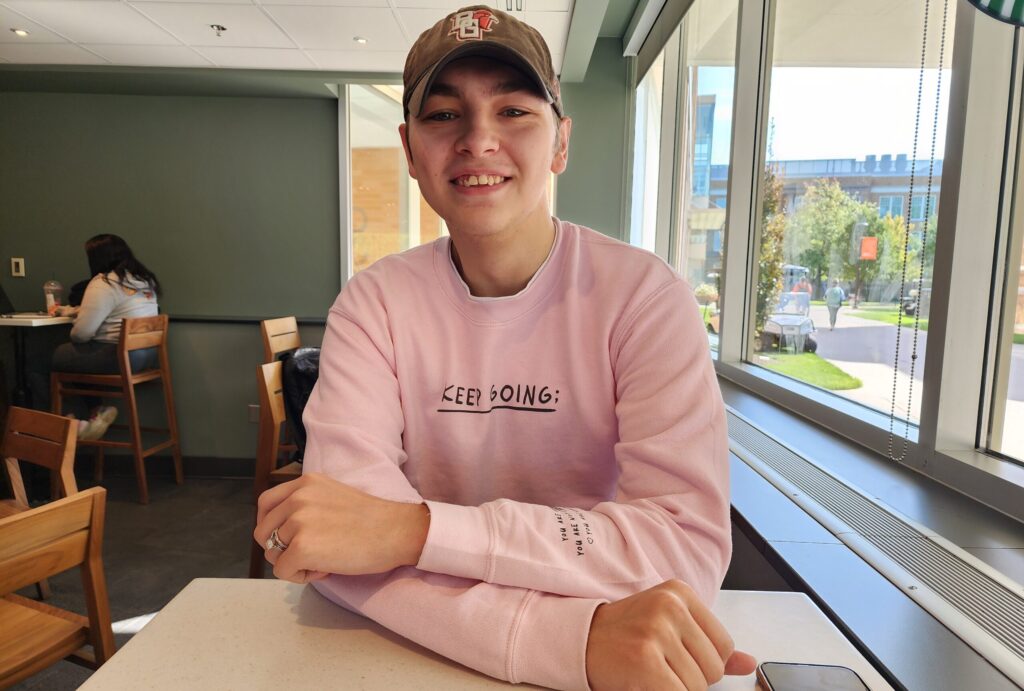
Damon Sherry, a candidate for the First Ward seat on Bowling Green City Council, wants to reach out to those in the community who feel ignored.
A political science major at Bowling Green State University, Sherry grew up in the village of Melrose, population 238, in Paulding County.
“I’m running for the simple reason that I care,” he said. “I think I have a lot of ideas for the city that could be implemented.”
Sherry, a Democrat, said his hometown government was pretty ineffective.
“Government didn’t help much,” he said. “I know what it’s like to be ignored.”
Sherry, who graduates in spring of 2024, said he intends to continue living in Bowling Green.
“I just really fell in love with this city. I’m committed to staying here.”
Sherry said he knows poverty – growing up with a single parent, below the poverty line, in a trailer, helping to raise his younger siblings. He said he is the first generation in his family to go to college.
He also knows about being perceived as different. If elected, Sherry said he would be the first openly queer and non-binary person on Bowling Green City Council.
Sherry said he has developed a “campaign of care” for the community.
“Change can be hard, but change is necessary,” he said. “I have ideas. I have solutions.”
During his time at BGSU, Sherry has served the Undergraduate Student Government, the College Democrats, and the Queer Trans Student Union.
As a renter himself, Sherry sees first hand the concerns about safe rental housing.
“I understand the needs of renters,” he said.
While campaigning door-to-door, he has encountered tenants with lists of deficiencies. He questioned the use of self-inspections by landlords to correct the problems.
“I think the city ought to hire an unbiased person to do inspections. We’ve learned in the past they haven’t told the truth,” he said about landlords. “I want to make sure everyone’s safe.”
Sherry would like to see the city expand its sustainability efforts.
“We need to find other alternatives, with the wind turbines sunsetting,” he said. He also suggested the city replace all its streetlights with LED lights.
“They save a lot of energy.”
Sherry would also like to see solar power expanded and a community garden planted.
“It helps people who are struggling to keep going. It provides them with healthy fruits and vegetables.”
He suggested a community garden would be an opportunity for teamwork between the city and university.
“It would be great to partner with the university on that,” he said. “I’d like to think the university is here as a benefit, not a threat to the community.”
And Sherry voiced support for the bond issue for a new Bowling Green High School.
“I absolutely support the school bond issue. I thoroughly believe in the investment in education,” he said. “We need to make sure our kids are getting everything they deserve.”


